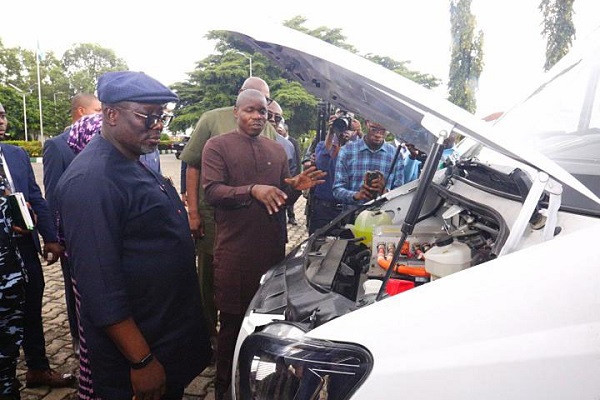The Delta State Government and Jet System Automobile Industry Limited have taken the first step towards establishing a partnership that could ease the transportation cost in the state.
The proposed deal revolves around the adoption of Electric Vehicles (EVs) and construction of EV Charging Hubs in the state.
With the high cost of fuel products, the state government and the company have entered into talks on the possibility of helping transporters in the state adopt the eco-friendly electric vehicles for mass transportation.
Jet Systems was led on the visit to the Delta State Governor, Sheriff Oborevwori, in Asaba, the capital by its Chairman, Chidi Ajaere and its Chief Operating Officer (COO), Joseph Osanipin.
Oborevwori, after inspecting the Jet Systems electric vehicles and test-drive, said the state might consider investing in electric vehicles for mass transportation to mitigate the impact of fuel subsidy removal.
The governor promised to set up a committee to be headed by Secretary to the State Government (SSG), Dr Kingsley Emu, to look into the viability and sustainability of electric vehicles.
He said: “This is the first time I have the opportunity to drive electric vehicles and you can see that it’s smooth, noiseless and comfortable, and with the way the price of fuel is going up, electric vehicles are better at this time because everybody is trying to move away from fuel to save cost.
“The EVs are cheaper. We are studying this model. Everybody is trying to go in that direction. It will also be economical and the good thing about this is that I am putting together a team headed by the SSG, to see if it is something the state can invest in.”
Ajaere said investing in EVs was good, considering that it is eco-friendly and cheaper.
He said the companies were investing in electric vehicles due to rising cost of petrol and maintenance.
Ajaere said: “The Federal Government is already taking the initiative of investing in electric vehicles. We have abundance of sun in Nigeria, so the government should look into building solar- powered charging infrastructure. With electric vehicles, you eliminate the cost of vehicle maintenance and fuel by almost 80 per cent. The life span of the battery is about 10 years and the bigger vehicles can do about 300km on a full charge; that’s like moving from Lagos to Ibadan and back to Lagos or from Asaba to Warri and back to Asaba.
“All we need is just the government to build solar-charging stations along the way for these vehicles when travelling a longer distance so that when the passengers come down to ease themselves like they usually do, you can plug in your car to charge for some time before continuing your journey.
“During the rainy season, the solar-charging infrastructure will have batteries that would store power for these vehicles to charge on gloomy days like this. Those stations can also be attached to CNG-powered lines to help charge vehicles during the rainy season.”












